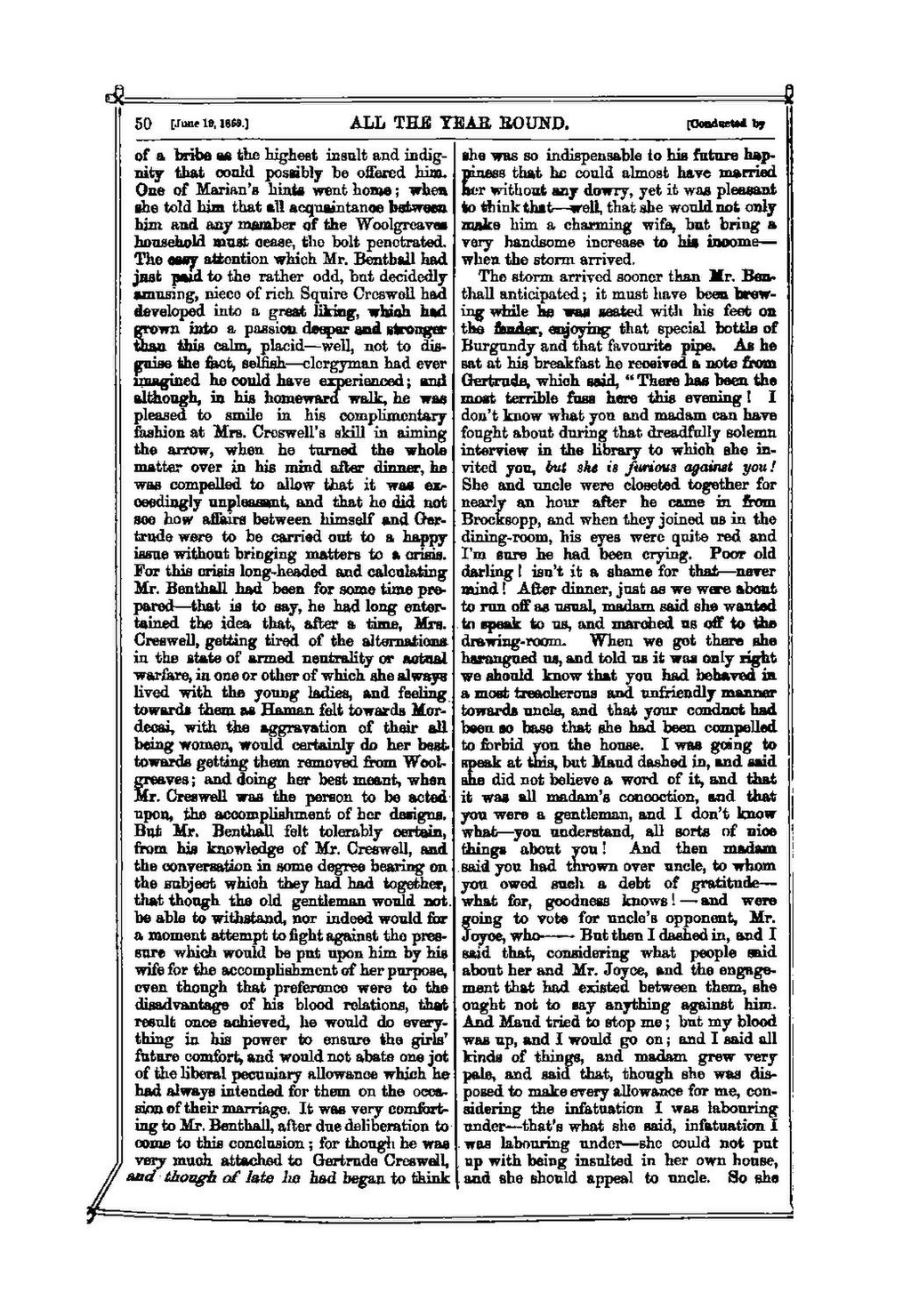of a bribe as the highest insult and indignity that could possibly be offered him. One of Marian's hints went home; when she told him that all acquaintance between him and any member of the Woolgreaves household most cease, the bolt penetrated. The cosy attention which Mr. Benthall had just paid to the rather odd, but decidedly amusing, niece of rich Squire Creswell had developed into a great liking, which had grown into a passion deeper and stronger than this calm, placid—well, not to disguise the fact, selfish—clergyman had ever imagined he could have experienced; and although, in his homeward walk, he was pleased to smile in his complimentary fashion at Mrs. Creswell's skill in aiming the arrow, when he turned the whole matter over in his mind after dinner, he was compelled to allow that it was exceedingly unpleasant, and that he did not see how affairs between himself and Gertrude were to be carried out to a happy issue without bringing matters to a crisis. For this crisis long-headed and calculating Mr. Benthall had been for some time prepared—that is to say, he had long entertained the idea that, after a time, Mrs. Creswell, getting tired of the alternations in the state of armed neutrality or actual warfare, in one or other of which she always lived with the young ladies, and feeling towards them as Haman felt towards Mordecai, with the aggravation of their all being women, would certainly do her best towards getting them removed from Woolgreaves; and doing her best meant, when Mr. Creswell was the person to be acted upon, the accomplishment of her designs. But Mr. Benthall felt tolerably certain, from his knowledge of Mr. Creswell, and the conversation in some degree bearing on the subject which they had had together, that though the old gentleman would not be able to withstand, nor indeed would for a moment attempt to fight against the pressure which would be put upon him by his wife for the accomplishment of her purpose, even though that preference were to the disadvantage of his blood relations, that result once achieved, he would do everything in his power to ensure the girls' future comfort, and would not abate one jot of the liberal pecuniary allowance which he had always intended for them on the occasion of their marriage. It was very comforting to Mr. Benthall, after due deliberation to come to this conclusion; for though he was very much attached to Gertrude Creswell, and though of late he had began to think she was so indispensable to his future happiness that he could almost have married her without any dowry, yet it was pleasant to think that—well, that she would not only make him a charming wife, but bring a very handsome increase to his income—when the storm arrived.
The storm arrived sooner than Mr. Benthall anticipated; it must have been brewing while he was seated with his feet on the fender, enjoying that special bottle of Burgundy and that favourite pipe. As he sat at his breakfast he received a note from Gertrude, which said, "There has been the most terrible fuss here this evening! I don't know what you and madam can have fought about during that dreadfully solemn interview in the library to which she invited you, but she is furious against you! She and uncle were closeted together for nearly an hour after he came in from Brocksopp, and when they joined us in the dining-room, his eyes were quite red and I'm sure he had been crying. Poor old darling! isn't it a shame for that—never mind! After dinner, just as we were about to run off as usual, madam said she wanted to speak to us, and marched us off to the drawing-room. When we got there she harangued us, and told us it was only right we should know that you had behaved in a most treacherous and unfriendly manner towards uncle, and that your conduct had been so base that she had been compelled to forbid you the house. I was going to speak at this, but Maud dashed in, and said she did not believe a word of it, and that it was all madam's concoction, and that you were a gentleman, and I don't know what—you understand, all sorts of nice things about you! And then madam said you had thrown over uncle, to whom you owed such a debt of gratitude—what for, goodness knows!—and were going to vote for uncle's opponent, Mr. Joyce, whoBut then I dashed in, and I said that, considering what people said about her and Mr. Joyce, and the engagement that had existed between them, she ought not to say anything against him. And Maud tried to stop me; but my blood was up, and I would go on; and I said all kinds of things, and madam grew very pale, and said that, though she was disposed to make every allowance for me, considering the infatuation I was labouring under—that's what she said, infatuation I was labouring under—she could not put up with being insulted in her own house, and she should appeal to uncle. So she
